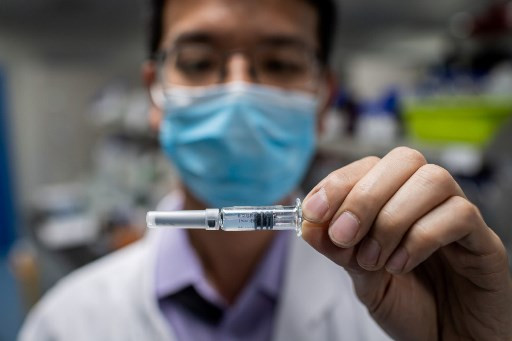Popular Reads
Top Results
Can't find what you're looking for?
View all search resultsPopular Reads
Top Results
Can't find what you're looking for?
View all search resultsBatan develops sterilization technology for COVID-19 vaccine
Change text size
Gift Premium Articles
to Anyone
L
ike any government institution, the National Nuclear Energy Agency (Batan) also plays a role in the nation’s efforts to tackle COVID-19, as it focuses on irradiation in the development of an antiserum and vaccine for the coronavirus.
Batam is part of the Research and Technology Ministry/National Research and Innovation Agency's (BRIN) COVID-19 research consortium.
Batan chief Anhar Riza Antariksawan said irradiation was essential in vaccine production. Radiation sterilization has been used to develop a variety of vaccine types, because it can eradicate chemical contaminants and penetrate pathogens to destroy nucleic acids without damaging the pathogen surface antigens.
“To produce vaccines of high quality, we need to perform sterilization during the production, which is done through a form of irradiation,” Anhar said on Oct. 2 as quoted by tempo.co.
According a study titled "Virus Irradiation and COVID-19 Disease", which was released by the Frontiers in Physics journal on Tuesday, virus irradiation has been performed for decades for basic research studies, sterilization and vaccine development.
The COVID-19 outbreak has led to an enormous worldwide effort for finding a vaccine against the coronavirus.
High doses of gamma rays can be used for the development of vaccines that exploit inactivated viruses. This technique has been gradually replaced by more practical methods, in particular the use of chemicals, but irradiation remains a simple and effective method used in some cases.
The technique employed for inactivating a virus has an impact on its ability to induce an adaptive immune response able to confer effective protection.
Assuring the quality of vaccines can increase the chances of recovery of COVID-19 patients. “Therefore, irradiation is an important element in defeating the virus,” said Anhar.
For the time being, Batan is still conducting tests to optimize the gamma ray dosage in order to make it effective for inactivating the virus without affecting the antigen of the COVID-19.
The COVID-19 research is not the first time for Batan to test gamma ray irradiation technology for the health sector, especially vaccine development. In 2003, the agency released a study on the effects of gamma ray irradiation on the development of Streptococcus agalactiae as a material to develop a vaccine for mastitis in dairy cows.
Apart from the COVID-19 vaccine research, Batan’s Nuclear Technology College (STTN) is developing ventilator technology for COVID-19 patients that is believed to have benefits over existing ones.
One of the plus points of Batan’s under-development ventilator is the use of control room technology, which allows one ventilator to cater to several patients.
“With this kind of ventilator, we will have more COVID-19 patients with severe symptoms to receive proper treatment and be saved,” said STTN principal Edy Giri Rachman Putra.
He went on to say that the said ventilator came from an idea of STTN lecturer Ayu Jati Puspitasari. Her proposal was among 17 best proposals, defeating 5,000 others, in the COVID-19 INA IDEAthon competition in May. (nkn)
Editor’s note: This article is part of a public campaign by the COVID-19 task force to raise people’s awareness about the pandemic.











